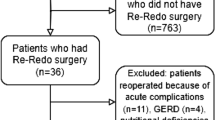Abstract
OBJECTIVE: To present the results of bariatric surgery performed in our hospital over the last ten years.
DESIGN: Longitudinal, clinical intervention with obesity surgery.
SUBJECTS: To date in our hospital we have performed bariatric surgery on 496 patients. Ninety-seven percent of them received a restrictive method and 3% a combined procedure. The mean age of our patients was 39±9 y. The mean weight was 144±28 kg which corresponds to a mean BMI of 51±8 kg/m2. The gender distribution is 18% male and 82% female patients.
MEASUREMENTS: Success of surgery with early and late complications, no laboratory measurements.
RESULTS: The early postoperative complications were the following: wound infection 3%, lethality 1.2%, pleural infusion 0.7% and evisceration 0.5%. The important late complications were pouch dilatation and stomastenosis in 18% and staple line disruption in 11%. Slippage of the adjustable silicone gastric banding (ASGB) amounted to 5% and hernias emerged in 7% of patients. A migration and band infection occurred in 0.7%. Reoperations were necessary in 10% of the silastic ring vertical gastroplasty (SRVG) and in 39% of the ASGB patients. Patients were followed up every two months in the first year and later, annually. Blood samples were taken after 25%, 50%, 75% and 100% loss of excess weight. To date, 91% of our patients have reached an excess weight loss of 25%. 71% lost half of their overweight and one third (32%) were able to reduce it by 75%. 8% of our patients attained normal weight.
CONCLUSIONS: For long term compliance and to avoid regain of weight, a close follow-up is necessary. We therefore offer special care which, in addition to the postoperative surgical care, includes visits by dieticians, internists, psychologists as well as exercise therapy. Knowledge of morbid obesity and skill in bariatric surgery are prior conditions to avoid complications and for success in bariatric surgery.
This is a preview of subscription content, access via your institution
Access options
Subscribe to this journal
Receive 12 print issues and online access
$259.00 per year
only $21.58 per issue
Buy this article
- Purchase on Springer Link
- Instant access to full article PDF
Prices may be subject to local taxes which are calculated during checkout
Similar content being viewed by others
Author information
Authors and Affiliations
Corresponding author
Rights and permissions
About this article
Cite this article
Wolf, A., Kortner, B. & Kuhlmann, H. Results of bariatric surgery. Int J Obes 25 (Suppl 1), S113–S114 (2001). https://doi.org/10.1038/sj.ijo.0801713
Issue Date:
DOI: https://doi.org/10.1038/sj.ijo.0801713



